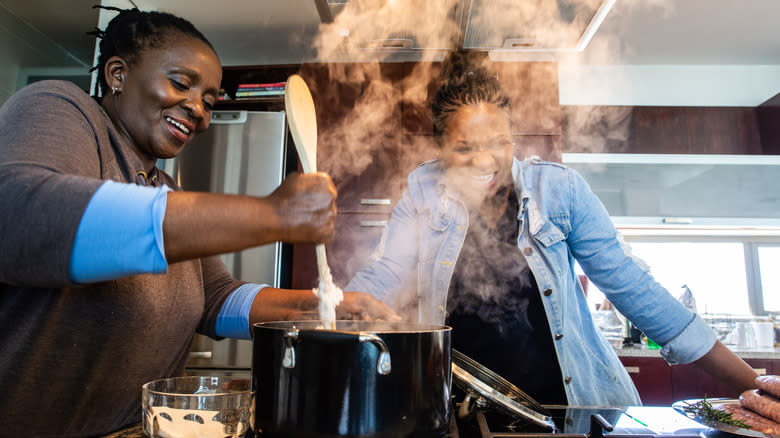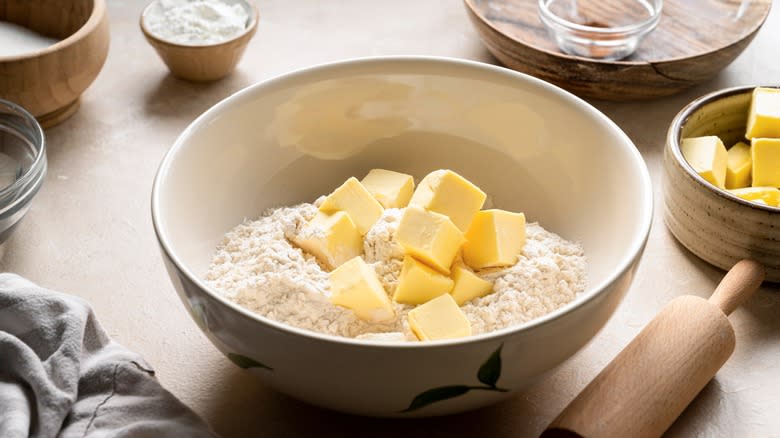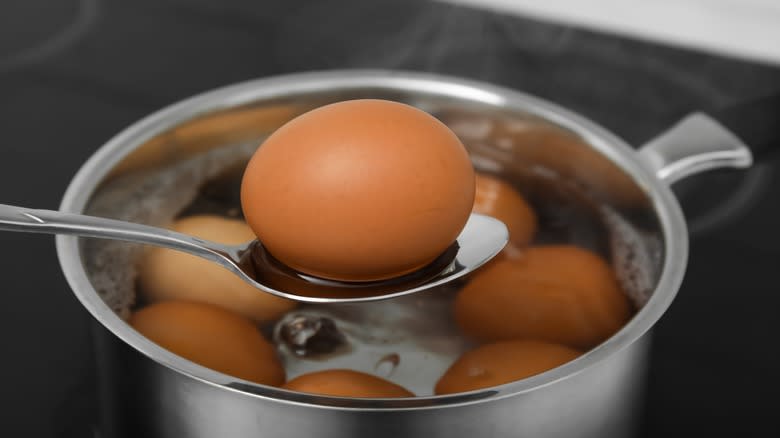Why It's Important To Know The Temperature Of Your Kitchen When Cooking

Maybe your pie crust turned out flat and tender, not golden and flaky. Or your kimchi never fermented and all you got was a pile of rotten cabbage. These cooking mishaps aren't just down to bad luck. They can happen because your kitchen was the wrong temperature.
Many recipes assume you're cooking at room temperature: Around 70 degrees Fahrenheit. But at the height of summer, your kitchen might hit 90 or above; in the depths of winter, it could linger in the 60s. Does it actually matter how hot or cold your kitchen is when you're assembling a turkey sandwich? No, not really. But there are recipes where it matters a great deal.
Unsurprisingly, a lot of those recipes involve baking. Baking isn't just an art, it's a science: Everything from humidity and altitude to, yes, ambient temperature, can affect the final product. Fermentation is temperature-sensitive, too. Too cold and the nice microorganisms can't do their thing; too hot and the nasty ones could rush in. Every home cook should know which recipes can be affected by a hot or cold kitchen — and how to adjust their cooking so everything turn out great, anyway.
Read more: This Was The Most Popular Recipe The Year You Were Born
Why Recipes Can Get Ruined By The Wrong Temperature

To understand why the temperature of your kitchen really matters, you only need to think of one ingredient: Butter. At room temperature, butter is soft and pliable. At 35 degrees Fahrenheit, it's hard. At 80 degrees Fahrenheit, it is too soft to pick up and at 94 degrees Fahrenheit, it melts. Depending on what you're cooking, you may need your butter to be much hotter or colder than your kitchen.
For any recipe that requires lamination — like croissants or puff pastry — you want your butter to be cold. Flaky, golden pastry is achieved when small lumps of fat coated in flour melt while baking, creating space. If those lumps melt before baking, the flakes can't develop. And in a hot kitchen, your butter will melt right before your eyes. But if you're whipping up butter and sugar for a coffee cake, you want your butter to be soft and warm. If it's too cold, it will take forever to incorporate.
Similarly, the temperature of eggs matters a great deal in baking. Some bakers say that room-temperature eggs are the key to the fluffiest cake possible. And if your kitchen is too cold, it could take ages to get your eggs to 70 degrees Fahrenheit.
It also matters when you're fermenting. Sauerkraut, for example, takes about a month to ferment at 70 degrees Fahrenheit, but might not ferment at just 10 degrees lower. At 80 degrees Fahrenheit, it can spoil.
How To Cook In A Kitchen That's Too Hot Or Too Cold

If you're about to cook something finicky, and your kitchen is uncomfortably warm or cold, you can just do your best to change the temperature. Open a window. Turn off the oven. Adjust the thermostat. Do whatever you have to do to get to room temperature. But sometimes, your kitchen is too hot or too cold, and there's not a whole lot you can do about it. You don't have to throw in the towel just yet.
When it's too hot, you have options. First, you can chill your implements. Putting your metal mixing bowl in the freezer keeps your ingredients cool, even if your kitchen is warm. Second, don't be afraid to take breaks -- there's no shame in popping your pastry in the fridge or cooling down your dough with a bag of frozen fruit. When it's too cold, you can adjust for that, too. Gently, carefully warm your ingredients. The quickest method for getting eggs to room temperature, for example, is to put them in a warm bowl of water — no 70-degree Fahrenheit room required.
Read the original article on Daily Meal.

